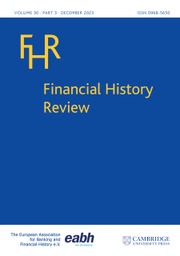-
- You have access: full
- Open access
- ISSN: 0968-5650 (Print), 1474-0052 (Online)
- Editors: Caroline Fohlin Emory University, USA, and Aldo Musacchio Brandeis University, USA
- Editorial board
Established in 1994, Financial History Review has earned a solid international reputation as an academic journal committed to research of high scholarly standards. The Review deliberately seeks to embrace a broad approach to financial, banking and monetary history, which appeals to a wide audience of historians, economists and practitioners. We welcome different perspectives including analytical narratives, theoretically-inspired research, advanced empirical analysis, and the interrelations between history, finance, policy, culture and society. FHR publishes research articles dealing with any historical period and country or regional area. The Review, through its section "The Past Mirror", is also an assiduous advocate of the relevance of history for a proper understanding of present financial and monetary developments. Financial History Review is fully open access.
Latest articles
History blog

-
Re-imagining Landscapes through Indigenous Literature
- 12 December 2025,
- “Maize Landscapes in Indigenous Literatures: Toward Alternative Cartographic Imaginaries” discusses the work of four 21st century poets who write bilingually...

-
The Chilean Christians for Socialism Movement: Liberationist, Third Worldist, and Utopian
- 12 December 2025,
- Recent scholarship on the long 1960s has moved beyond the solely political dimensions of the era to recognize the religious impulses that shaped cultural and...

-
Rural Scotland and the Kapp Putsch
- 04 December 2025,
- The Scottish Farm Servant is not a well-known journal. Established in 1913, amongst the wider maelstrom of the ‘Labour Unrest’, the journal served as the official...

Twitter